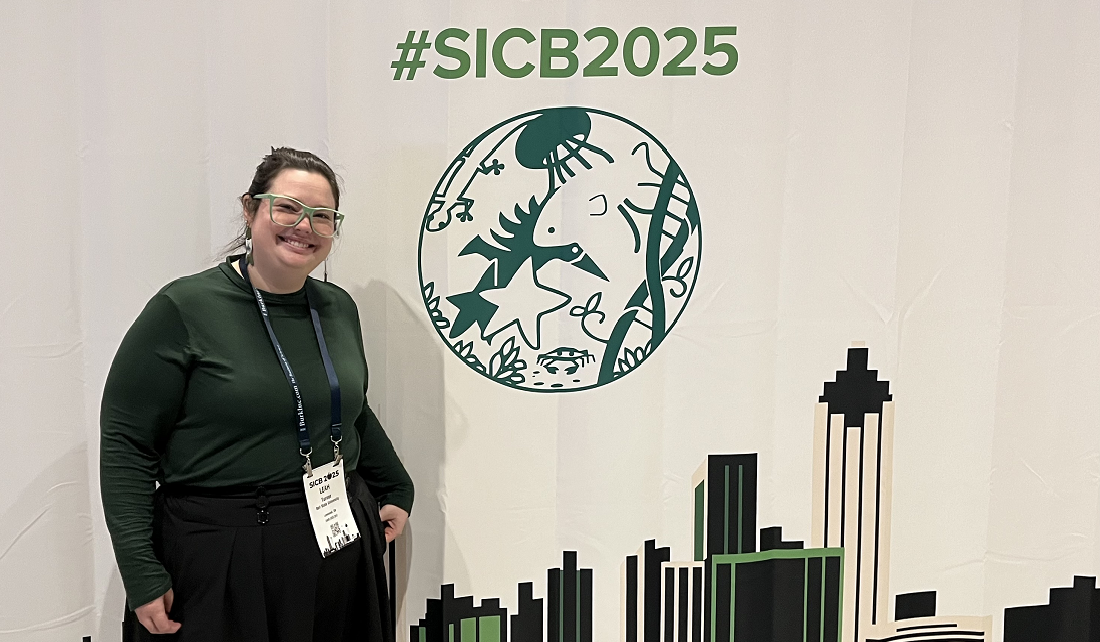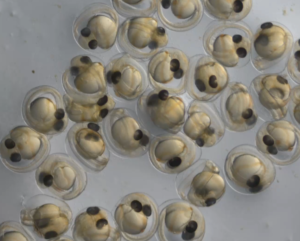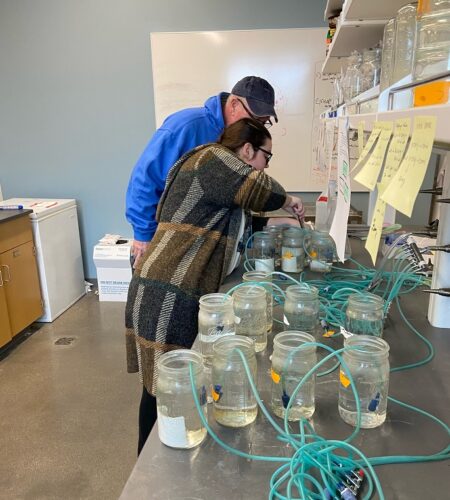
Meet Our Grad Student Scholars is a series from Illinois-Indiana Sea Grant (IISG) celebrating the students and research funded by our scholars program. To learn more about our faculty and graduate student funding opportunities, visit Fellowships & Scholarships.
Leah Turner is a second-year master’s student in the Department of Biology at Ball State University. Leah works in the Ward Lab, studying the effects of environmental contaminants on the behavior and cognition of fish at early life stages. The project funded by IISG is to study the developmental exposure of fathead minnows (Pimephales promelas) to citalopram, a common SSRI, to determine if citalopram alters development, behavior, or learning.

A close-up view of fathead minnow eggs under the microscope showing the early development stages with clearly visible eyes and body structure.
The Great Lakes have been a constant presence in my life—not just as a place of recreation but as a source of inspiration and now the foundation of my research.
As an Illinois-Indiana Sea Grant (IISG) scholar, I have the opportunity to merge my passion for these waters with my commitment to understanding the impacts of human activity on aquatic ecosystems.
My current research focuses on the behavioral effects of citalopram, a commonly prescribed antidepressant that makes its way into freshwater environments. Although intended to benefit human mental health, this pharmaceutical’s unintended presence in aquatic systems raises important concerns. How does citalopram exposure affect the development and behavior of aquatic organisms? What are the broader implications of exposure for freshwater ecosystem health?
To investigate these questions, I study fathead minnows (Pimephales promelas), a species frequently used in aquatic toxicology due to their ecological significance. My work examines how early-life exposure to citalopram influences critical behaviors such as embryonic activity, fear responses, social interactions, and learning. These behaviors are essential for survival and reproduction, making them important indicators of potential ecosystem-level impacts.

Leah Turner examines fathead minnow larvae in the lab, monitoring exposure conditions as part of her research on the behavioral effects of citalopram.
Pharmaceutical pollutants like citalopram are an often-overlooked threat to freshwater environments. By studying their effects on aquatic life, I hope to contribute to strategies that mitigate these impacts and preserve the biodiversity of ecosystems like the Great Lakes. This research also emphasizes the need for greater awareness and actionable solutions to reduce the introduction of such contaminants into our waterways.
The IISG Scholar Program has been instrumental in my growth as both a researcher and a communicator. Through this program, I’ve been able to engage with communities, share scientific findings, and advocate for sustainable practices that protect vital freshwater resources.
Looking ahead, I’m motivated by the potential to drive meaningful change—whether through advancing research, informing environmental policies, or mentoring future scientists. The Great Lakes are a resource worth protecting, and I’m proud to contribute to efforts that ensure their health for generations to come.

